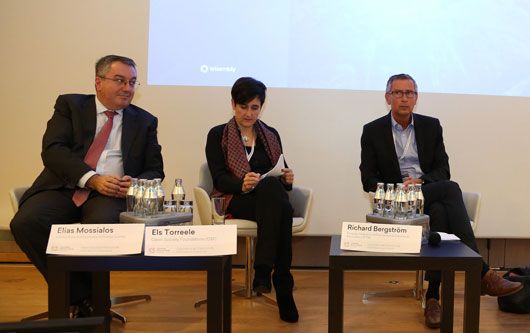Bergström in the Crossfire
If Richard Bergström was not already planning his departure as Director General of EFPIA, his participation in a panel session at last week’s European Health Forum Gastein might have pushed him towards it.
If Richard Bergström was not already planning his departure as Director General of the European Federation of Pharmaceutical Industries and Associations (EFPIA), his participation in a panel session at September's European Health Forum Gastein (Austria) might have pushed him towards it.
Bergström shared the platform with Professor Elias Mossialos of the London School of Economics and Els Torreele, Director of Access to Medicines and Innovation at Open Society Foundations, who both directed a litany of charges at the industry for its lack of transparency, its greed, monopolistic practices and, well, general egregiousness.
Noting that the Top 10 Fortune pharma companies earn more than the rest of the Fortune 500 companies, Mossialos suggested that the industry equation of 13% R&D spend vs 25% promotional spend should be reversed. His biggest concern though was about the lack of comparative data for drugs at market entry, although he conceded that this was "a regulatory framework failure". He went on: “We incentivize the pharma industry to develop long, costly and inefficient treatments. We don’t incentivize it to provide cures.”
Torreele accused pharma of pricing drugs “as high as they can get away with” and slammed the policy of pricing on the ability to pay as “extortion”. She further pointed out that “we don’t have any transparency about how R&D cost is broken down”.
Bergström may have been a little ruffled when he took the mic, as he offered thanks both to EHFG for inviting him and “to the Brussels police for letting us out of jail for a week - by the sound of the previous presentation, we obviously belong there!” Nevertheless, he defiantly explained that “Europe decided to implement HTA and cost development assessment, so we complied. We show value and argue a price based on cost-effectiveness assessment. But now we hear, ‘No, we don’t want that model now’”. He conceded that in Europe “we have pricing controls and we have HTAs but we don’t necessarily use these tools correctly” and suggested that replacing medicine prices “with payments for real results” is an alternative option that can be explored, but “we have to be very careful about just getting rid of the current model”.
If he’d begun the session under fire, Bergström at least had the last word. As he reminded the audience, it is EFPIA itself that arranges training to enable payers to better negotiate with industry on pricing!
Richard Bergstrom (right) defends the industry at the European Health Forum Gastein.
